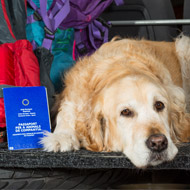Government updates advice on pet travel

Pets will be able to travel under their current EU pet passport until a leave date is confirmed.
The Government has published updated guidance for official veterinarians (OVs) on pet travel in the event of a no-deal Brexit.
It comes after the UK government agreed to an extension of Article 50, meaning that Brexit will be delayed until at least 12 April.
In an email to BSAVA members, the APHA indicates that Animal Health Certificates (AHC) are no longer required until the leave date is known. Until then, pets will be able to travel to the EU under their current EU pet passport.
‘If you have issued AHCs to pet owners for travel on or after 30 March, the AHC is valid for travel to the EU for up to 10 days after issue,’ the APHA states. ‘You may wish to advise affected pet owners that they can continue to use the current EU pet passport until the date the UK leaves the EU.’
When the UK does leave the EU, with or without a deal, it will be classed as a third country. Therefore the documents required for pet travel to the EU will depend on whether the UK is categorised as Part 1 unlisted, Part 2 unlisted or uncategorised.
If MPs reach a deal and confirm an implementation period, pets will be able to continue to travel to the EU under their current EU pet passport.
If the UK becomes an unlisted or Part 2 listed country, however, an AHC will be required. These are only valid for travel up to 10 days from their date of issue.
‘If the UK leaves the EU without a deal, you should issue AHCs for any pets travelling after the confirmed date the UK leaves the EU,’ the APHA writes. ‘You should continue to order AHCs to prepare for the scenario that the UK leaves the EU without a deal.’
An order form for the ACHs is available on the APHA's Vet Gateway.



 The latest
The latest